现在完成时讲解与练习答案
人教新目标初中英语语法-现在完成时讲解以及练习题(含答案)
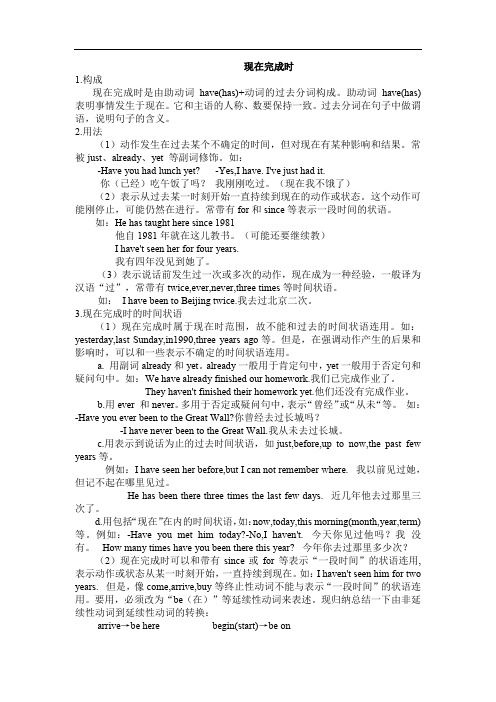
现在完成时1.构成现在完成时是由助动词have(has)+动词的过去分词构成。
助动词have(has)表明事情发生于现在。
它和主语的人称、数要保持一致。
过去分词在句子中做谓语,说明句子的含义。
2.用法(1)动作发生在过去某个不确定的时间,但对现在有某种影响和结果。
常被just、already、yet 等副词修饰。
如:-Have you had lunch yet? -Yes,I have. I've just had it.你(已经)吃午饭了吗?我刚刚吃过。
(现在我不饿了)(2)表示从过去某一时刻开始一直持续到现在的动作或状态。
这个动作可能刚停止,可能仍然在进行。
常带有for和since等表示一段时间的状语。
如:He has taught here since 1981他自1981年就在这儿教书。
(可能还要继续教)I have't seen her for four years.我有四年没见到她了。
(3)表示说话前发生过一次或多次的动作,现在成为一种经验,一般译为汉语“过”,常带有twice,ever,never,three times等时间状语。
如:I have been to Beijing twice.我去过北京二次。
3.现在完成时的时间状语(1)现在完成时属于现在时范围,故不能和过去的时间状语连用。
如:yesterday,last Sunday,in1990,three years ago等。
但是,在强调动作产生的后果和影响时,可以和一些表示不确定的时间状语连用。
a. 用副词already和yet。
already一般用于肯定句中,yet一般用于否定句和疑问句中。
如:We have already finished our homework.我们已完成作业了。
They haven't finished their homework yet.他们还没有完成作业。
b.用ever 和never。
现在完成时与现在完成进行时态讲解及练习(含答案)
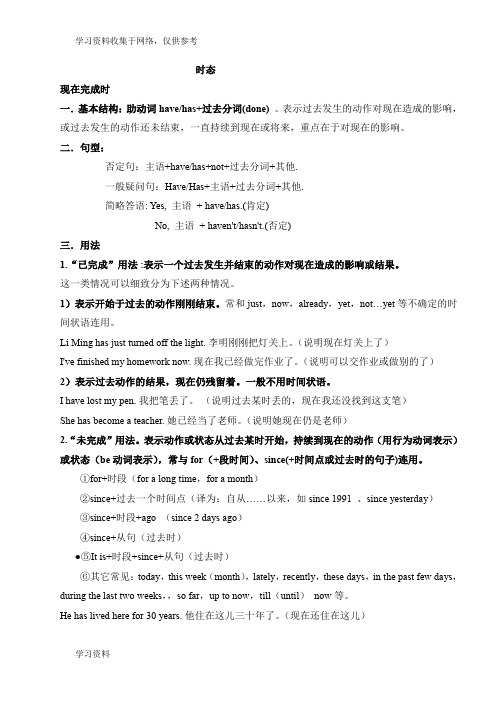
时态现在完成时一.基本结构:助动词have/has+过去分词(done) 。
表示过去发生的动作对现在造成的影响,或过去发生的动作还未结束,一直持续到现在或将来,重点在于对现在的影响。
二.句型:否定句:主语+have/has+not+过去分词+其他.一般疑问句:Have/Has+主语+过去分词+其他.简略答语: Yes, 主语+ have/has.(肯定)No, 主语+ haven't/hasn't.(否定)三.用法1.“已完成”用法 :表示一个过去发生并结束的动作对现在造成的影响或结果。
这一类情况可以细致分为下述两种情况。
1)表示开始于过去的动作刚刚结束。
常和just,now,already,yet,not…yet等不确定的时间状语连用。
Li Ming has just turned off the light. 李明刚刚把灯关上。
(说明现在灯关上了)I've finished my homework now. 现在我已经做完作业了。
(说明可以交作业或做别的了)2)表示过去动作的结果,现在仍残留着。
一般不用时间状语。
I have lost my pen. 我把笔丢了。
(说明过去某时丢的,现在我还没找到这支笔)She has become a teacher. 她已经当了老师。
(说明她现在仍是老师)2.“未完成”用法。
表示动作或状态从过去某时开始,持续到现在的动作(用行为动词表示)或状态(be动词表示),常与for(+段时间)、since(+时间点或过去时的句子)连用。
①for+时段(for a long time,for a month)②since+过去一个时间点(译为:自从……以来,如since 1991 、since yesterday)③since+时段+ago (since 2 days ago)④since+从句(过去时)●⑤It is+时段+since+从句(过去时)⑥其它常见:today,this week(month),lately,recently,these days,in the past few days,during the last two weeks,,so far,up to now,till(until)now等。
【英语】英语现在完成时解题技巧讲解及练习题(含答案)含解析
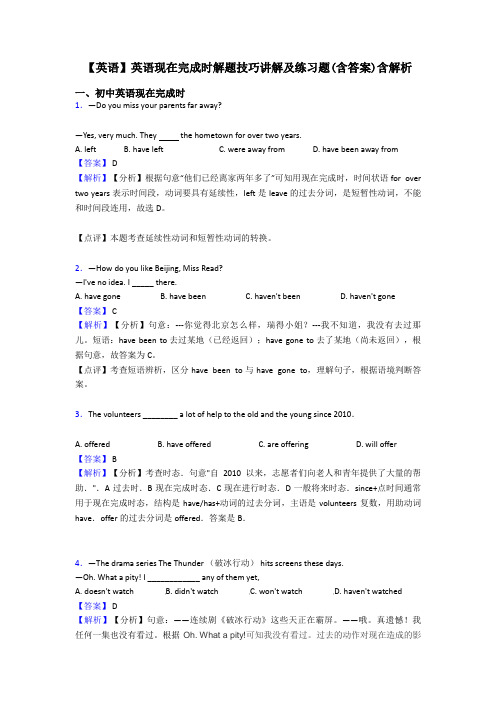
【英语】英语现在完成时解题技巧讲解及练习题(含答案)含解析一、初中英语现在完成时1.—Do you miss your parents far away?—Yes, very much. They the hometown for over two years.A. leftB. have leftC. were away fromD. have been away from【答案】 D【解析】【分析】根据句意“他们已经离家两年多了”可知用现在完成时,时间状语for over two years 表示时间段,动词要具有延续性,left是 leave的过去分词,是短暂性动词,不能和时间段连用,故选D。
【点评】本题考查延续性动词和短暂性动词的转换。
2.—How do you like Beijing, Miss Read?—I've no idea. I _____ there.A. have goneB. have beenC. haven't beenD. haven't gone【答案】 C【解析】【分析】句意:---你觉得北京怎么样,瑞得小姐?---我不知道,我没有去过那儿。
短语:have been to去过某地(已经返回);have gone to去了某地(尚未返回),根据句意,故答案为C。
【点评】考查短语辨析,区分have been to与have gone to,理解句子,根据语境判断答案。
3.The volunteers ________ a lot of help to the old and the young since 2010.A. offeredB. have offeredC. are offeringD. will offer【答案】 B【解析】【分析】考查时态.句意"自2010以来,志愿者们向老人和青年提供了大量的帮助.".A过去时.B现在完成时态.C现在进行时态.D一般将来时态.since+点时间通常用于现在完成时态,结构是have/has+动词的过去分词,主语是volunteers复数,用助动词have.offer的过去分词是offered.答案是B.4.—The drama series The Thunder (破冰行动) hits screens these days.—Oh. What a pity! I ____________ any of them yet,A. doesn't watchB. didn't watchC. won't watchD. haven't watched【答案】 D【解析】【分析】句意:——连续剧《破冰行动》这些天正在霸屏。
【英语】高三英语现在完成时解题技巧讲解及练习题(含答案)
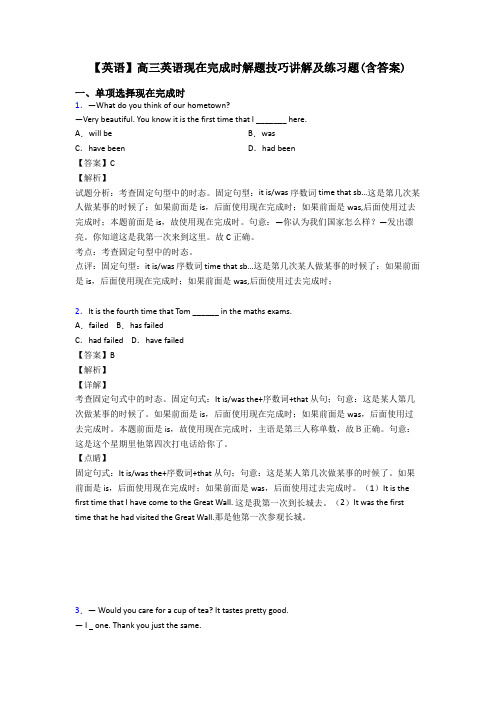
【英语】高三英语现在完成时解题技巧讲解及练习题(含答案)一、单项选择现在完成时1.―What do you think of our hometown?―Very beautiful. You know it is the first time that I _______ here.A.will be B.wasC.have been D.had been【答案】C【解析】试题分析:考查固定句型中的时态。
固定句型:it is/was 序数词time that sb…这是第几次某人做某事的时候了;如果前面是is,后面使用现在完成时;如果前面是was,后面使用过去完成时;本题前面是is,故使用现在完成时。
句意:—你认为我们国家怎么样?—发出漂亮。
你知道这是我第一次来到这里。
故C正确。
考点:考查固定句型中的时态。
点评:固定句型:it is/was 序数词time that sb…这是第几次某人做某事的时候了;如果前面是is,后面使用现在完成时;如果前面是was,后面使用过去完成时;2.It is the fourth time that Tom ______ in the maths exams.A.failed B.has failedC.had failed D.have failed【答案】B【解析】【详解】考查固定句式中的时态。
固定句式:It is/was the+序数词+that 从句;句意:这是某人第几次做某事的时候了。
如果前面是is,后面使用现在完成时;如果前面是was,后面使用过去完成时。
本题前面是is,故使用现在完成时,主语是第三人称单数,故B正确。
句意:这是这个星期里他第四次打电话给你了。
【点睛】固定句式:It is/was the+序数词+that 从句;句意:这是某人第几次做某事的时候了。
如果前面是is,后面使用现在完成时;如果前面是was,后面使用过去完成时。
(1)It is the first time that I have come to the Great Wall. 这是我第一次到长城去。
英语现在完成时答题技巧及练习题(含答案)及解析

英语现在完成时答题技巧及练习题(含答案)及解析一、初中英语现在完成时1.—Where's your father?—He _______ to Changsha.A. have beenB. has goneC. has beenD. have gone【答案】B【解析】【分析】句意:——你爸爸在哪?——他去了长沙。
因为父亲不在,证明他去了某个地方没有回来。
之前发生的动作对现在造成的影响用现在完成时,结构为have/has+过去分词,主语he是第三人称单数,助动词用has,go的过去分词是gone,故选B。
【点评】考查现在完成时,注意去过某地用have/has been to,去了某地用have/has gone to。
2.My father ____ in a panda protection center for 10 years, so he knows a lot about panda.A. was workingB. is workingC. has workedD. will work【答案】 C【解析】【分析】句意:我父亲在熊猫保护中心工作了10年,所以他对熊猫很了解。
由句中的语句for 10 years 提示可知,此句要用现在完成时,主语my father,助动词要用has,故选C。
【点评】考查现在完成时的基本结构及用法,注意根据句子的时间状语判断时态。
3.—Your shoes are so old. Why don't you buy a new pair?—Because I all my money on an MP5.A. spendB. have spentC. am spendingD. was spending【答案】 B【解析】【分析】因为把所有的钱都花在MP5上,所以没钱买鞋。
强调过去发生的动作对现在的影响,应用现在完成时,故选B。
【点评】考查现在完成时的用法,强调过去发生的动作对现在造成的影响。
初中现在完成时讲解练习及答案_4

现在完成时精讲和专练I.定义:表示过去发生或已经完成的动作对现在造成的影响或结果,也可以表示过去已经开始,一直延续到现在的动作或状态II.现在完成时的结构肯定句:have/has+ done (过去分词)否定句:主语+have/has+not+ done (过去分词)+其他.一般疑问句:Have/Has+主语+ done (过去分词)+其他.简略答语: Yes, 主语+ have/has.(肯定)No, 主语+ haven't/hasn't.(否定)注意:表示短暂时间动作的词,如:come,go,die,marry,buy等的完成时不能与for,since等表示一段时间的词连用。
用来持续的动作或状态或表过去重复的动作,如live,study,be,wait等,常和since(自从)或for(经历)引导的词语连用。
如:I have lived here for more than thirty years.我已在此住了30多年。
III.现在完成时的标志1.现在完成时的含义之一是过去完成的动作对现在仍有影响, 现在完成时通常和,ever, never, twice(once…), so far(到目前为止), since,for,in the past/last few years(在过去几年), already(肯定句), yet(否定,疑问句), just(刚刚), before(以前), recently (近来)等词连用说明:already与yet都有“已经”的意思,但already常用于肯定句,并用于句中。
yet 常用于否定句和疑问句,并用于句末。
例如:I have already finished my homework.I haven’t finished my homework yet. Have you finished your homework yet?They have left. (他们已经离开了,也就是说现在他们人不在这里)I have had my lunch. (我已经吃过午饭了,也就是说我现在不饿)I can’t find my watch now. I think I have already lost it.2.过去已经开始的动作一直延续到现在, 甚至有可能继续延续下去,我们可以从动作“延续”的特性和“时间”点段的区分入手。
(完整版)现在完成时讲解及练习题及答案

(完整版)现在完成时讲解及练习题及答案时态讲解:现在完成时(1)构成:现在完成时由助动词have + 过去分词构成,助动词have 有⼈称和数的变化。
第三⼈称单数⽤has,其余⽤have.现在完成时的否定式直接在助动词后⾯加上not、疑问式是把助动词提到主语之前。
以study 为例,其否定式、疑问式和简单回答形式如下:(2)⽤法:1)现在完成时通常表⽰在说话之前已经完成的动作或存在的状态。
说话⼈强调的是该动作或状态对现在的结果或影响。
My daughter has just gone out. 我⼥⼉刚出去。
I’m sure we’ve met before. 我肯定我们以前见过⾯。
She has arrived. 她到了。
2)表⽰持续到现在的动作或状态,往往和包括现在在内的表⽰⼀段时间的状语连⽤,如recently, already, just, lately, for…, since…,yet等。
如:I haven’t heard from her these days. 这些⽇⼦我没有收到她的信。
We haven’t seen you recently. 最近我们没有见到你。
They have been away for two years. 他们离开已经两年了。
She has been with us since Monday.★注意:1)since和for的区别since后接时间点,如1993,last term, yesterday, the time I got therefor后接⼀段时间,表⽰“长达多久”,如ten years, a while, two days等。
Exercise: ⽤since和for填空1. Jim has been in Ireland ______ Monday.2. Jill has been in Ireland ______ three days.3. His aunt has lived in Australia ______15 days.4. Mary is in her office. She has been there ______ 7 o'clock.5. India has been an independent country ______1974.6. The bus is late. They've been waiting ______ 20 minutes.7. Nobody lives in those houses. They have been empty ______ many years.8. Mike has been ill ______a long time. He has been in hospital ______ October.2)表⽰短暂意义的动词如arrive, leave, borrow, buy, begin, start, die等,在完成时当中不能和表⽰⼀段时间的状语连⽤,因为它们表⽰的动作不可能持续。
现在完成时讲解及练习(答案)
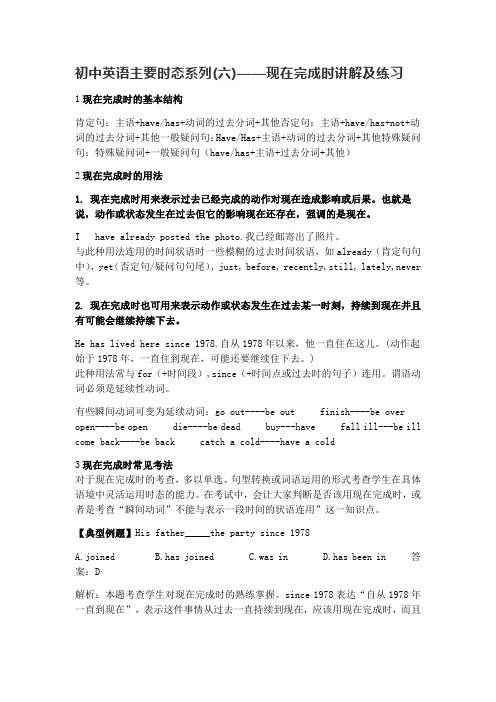
初中英语主要时态系列(六)——现在完成时讲解及练习1现在完成时的基本结构肯定句:主语+have/has+动词的过去分词+其他否定句:主语+have/has+not+动词的过去分词+其他一般疑问句:Have/Has+主语+动词的过去分词+其他特殊疑问句:特殊疑问词+一般疑问句(have/has+主语+过去分词+其他)2现在完成时的用法1. 现在完成时用来表示过去已经完成的动作对现在造成影响或后果。
也就是说,动作或状态发生在过去但它的影响现在还存在,强调的是现在。
I have already posted the photo.我已经邮寄出了照片。
与此种用法连用的时间状语时一些模糊的过去时间状语,如already(肯定句句中), yet(否定句/疑问句句尾), just, before, recently,still, lately,never 等。
2. 现在完成时也可用来表示动作或状态发生在过去某一时刻,持续到现在并且有可能会继续持续下去。
He has lived here since 1978.自从1978年以来,他一直住在这儿。
(动作起始于1978年,一直住到现在,可能还要继续住下去。
)此种用法常与for(+时间段),since(+时间点或过去时的句子)连用。
谓语动词必须是延续性动词。
有些瞬间动词可变为延续动词:go out----be out finish----be over open----be open die----be dead buy---have fall ill---be ill come back----be back catch a cold----have a cold3现在完成时常见考法对于现在完成时的考查,多以单选、句型转换或词语运用的形式考查学生在具体语境中灵活运用时态的能力。
在考试中,会让大家判断是否该用现在完成时,或者是考查“瞬间动词”不能与表示一段时间的状语连用”这一知识点。
牛津译林版英语八下_Units 1-3 现在完成时语法讲解和练习
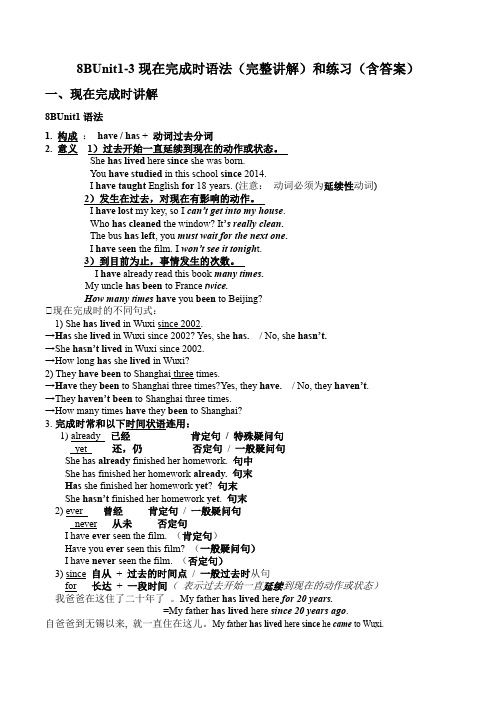
8BUnit1-3现在完成时语法(完整讲解)和练习(含答案)一、现在完成时讲解8BUnit1语法1. 构成:have / has + 动词过去分词2. 意义1)过去开始一直延续到现在的动作或状态。
She has lived here since she was born.You have studied in this school since 2014.I have taught English for 18 years. (注意:动词必须为延续性动词)2)发生在过去,对现在有影响的动作。
I have lost my key, so I can’t get into my house.Who has cleaned the window? It’s really clean.The bus has left, you must wait for the next one.I have seen the film. I won’t see it tonigh t.3)到目前为止,事情发生的次数。
I have already read this book many times.My uncle has been to France twice.How many times have you been to Beijing?★现在完成时的不同句式:1) She has lived in Wuxi since 2002.→Has she lived in Wuxi since 2002? Yes, she has./ No, she hasn’t.→She hasn’t lived in Wuxi since 2002.→How long has she lived in Wuxi?2) They have been to Shanghai three times.→Have they been to Shanghai three times?Yes, they have./ No, they haven’t.→They haven’t been to Shanghai three times.→How many times have they been to Shanghai?3.完成时常和以下时间状语连用:1)already 已经肯定句/ 特殊疑问句yet 还,仍否定句/ 一般疑问句She has already finished her homework. 句中She has finished her homework already.句末Has she finished her homework yet? 句末She hasn’t finished her homework yet. 句末2) ever 曾经肯定句/ 一般疑问句never 从未否定句I have ever seen the film. (肯定句)Have you ever seen this film? (一般疑问句)I have never seen the film. (否定句)3) since 自从+ 过去的时间点/ 一般过去时从句for 长达+ 一段时间(表示过去开始一直延续到现在的动作或状态)我爸爸在这住了二十年了。
(完整版)现在完成时讲解(含讲解及习题)(可编辑修改word版)
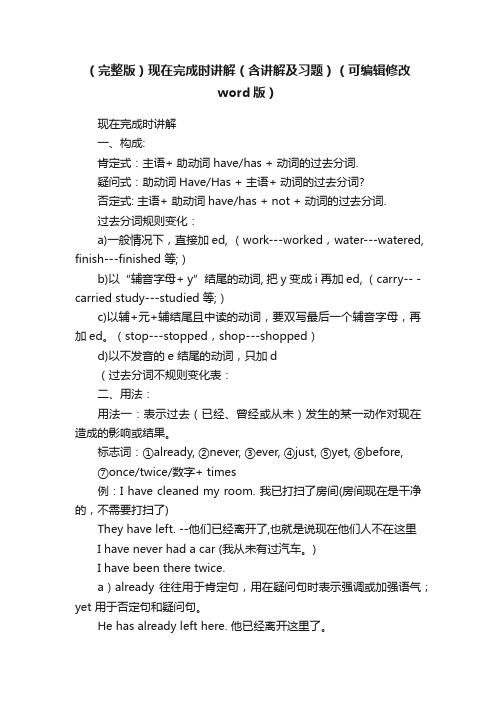
(完整版)现在完成时讲解(含讲解及习题)(可编辑修改word版)现在完成时讲解一、构成:肯定式:主语+ 助动词have/has + 动词的过去分词.疑问式:助动词Have/Has + 主语+ 动词的过去分词?否定式: 主语+ 助动词have/has + not + 动词的过去分词.过去分词规则变化:a)一般情况下,直接加ed, (work---worked,water---watered, finish---finished 等;)b)以“辅音字母+ y”结尾的动词, 把y 变成i 再加ed, (carry-- -carried study---studied 等;)c)以辅+元+辅结尾且中读的动词,要双写最后一个辅音字母,再加ed。
(stop---stopped,shop---shopped)d)以不发音的e 结尾的动词,只加d(过去分词不规则变化表:二、用法:用法一:表示过去(已经、曾经或从未)发生的某一动作对现在造成的影响或结果。
标志词:①already, ②never, ③ever, ④just, ⑤yet, ⑥before,⑦once/twice/数字+ times例:I have cleaned my room. 我已打扫了房间(房间现在是干净的,不需要打扫了)They have left. --他们已经离开了,也就是说现在他们人不在这里I have never had a car (我从未有过汽车。
)I have been there twice.a)already 往往用于肯定句,用在疑问句时表示强调或加强语气;yet 用于否定句和疑问句。
He has already left here. 他已经离开这里了。
Has he already left here? 他(真的)已经离开这里了吗?(表示加强语气)My teachers haven’t had breakfast yet. 我的老师们还没有吃早饭。
(完整版)高一现在完成时讲解及练习(含答案)
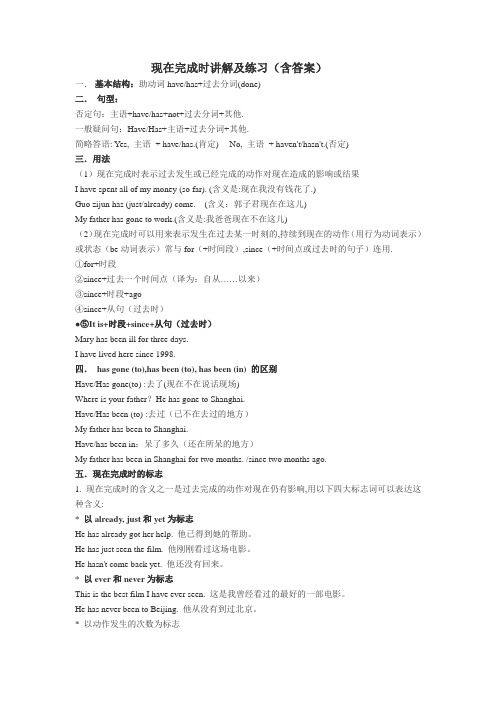
现在完成时讲解及练习(含答案)一.基本结构:助动词have/has+过去分词(done)二.句型:否定句:主语+have/has+not+过去分词+其他.一般疑问句:Have/Has+主语+过去分词+其他.简略答语: Yes, 主语+ have/has.(肯定) No, 主语+ haven't/hasn't.(否定)三.用法(1)现在完成时表示过去发生或已经完成的动作对现在造成的影响或结果I have spent all of my money (so far). (含义是:现在我没有钱花了.)Guo zijun has (just/already) come. (含义:郭子君现在在这儿)My father has gone to work.(含义是:我爸爸现在不在这儿)(2)现在完成时可以用来表示发生在过去某一时刻的,持续到现在的动作(用行为动词表示)或状态(be动词表示)常与for(+时间段),since(+时间点或过去时的句子)连用.①for+时段②since+过去一个时间点(译为:自从……以来)③since+时段+ago④since+从句(过去时)●⑤It is+时段+since+从句(过去时)Mary has been ill for three days.I have lived here since 1998.四.has gone (to),has been (to), has been (in) 的区别Have/Has gone(to) :去了(现在不在说话现场)Where is your father?He has gone to Shanghai.Have/Has been (to) :去过(已不在去过的地方)My father has been to Shanghai.Have/has been in:呆了多久(还在所呆的地方)My father has been in Shanghai for two months. /since two months ago.五.现在完成时的标志1. 现在完成时的含义之一是过去完成的动作对现在仍有影响,用以下四大标志词可以表达这种含义:* 以already, just和yet为标志He has already got her help. 他已得到她的帮助。
现在完成时讲解和练习(有答案)

现在完成时讲解和练习1. 现在完成时的构成: have\has+过去分词(过去分词的构成有规则变化和不规则变化)2. 现在完成时的四个基本句型肯定句He has finished the work.一般疑问句Has he finished the work? 回答Yes ,he has. No, he hasn’t.否定句He has not finished the work.特殊疑问句What has he done?3.现在完成时的用法:A.表示过去发生或已经完成的动作对现在造成的影响或结果,强调对现在造成的影想或结果)。
例如:The car has arrived. 车子来了。
(结果:车子已在门口)Someone has broken the window.有人把窗户打破了。
(结果:窗户仍破着)B. 表示过去已经开始,持续到现在的动作或状态,可以和表示从过去某一时刻延续到现在(包括“现在”在内)的一段时间的状语连用,如for+时间段、since+过去的时间点、疑问词how long等。
例如: My uncle has worked at this factory for five years. 我叔叔在这个工厂工作已经五年了。
Mr. Black has lived in China since 2002. 自从2002年Mr. Black 一直住在中国。
How long have you been here? 你来这里多久了?4. 在下列情形下用现在完成时(1)九词语①already已经肯定句中或句尾e.g.: I have already found my pen.= I have found my pen already.②yet已经否定句和疑问句句尾e.g.:I have not finished the work yet.Have you bought a computer yet?③ever曾经句中e.g.:Have you ever seen pandas?④never从不句中e.g.:I have never been to Beijing. ⑤just刚刚句中e.g.:I have just done my work.⑥before以前句尾e.g.:I have never been there before.⑦so far到目前为止e.g.:So far he has learnt 200 words.⑧how long多久e.g.:How long have you lived here?⑨how many times多少次e.g.:How many times has he been to Beijing?(3)三词组1.have<has>gone to去了某地表示“已经去了某地,在去那里的途中或到达那里还没有回来”e.g.:He has gone to Beijing (去了北京)2.have<has>been to去过某地表示“曾去过某地,已经从那里回来了”e.g.:He has been to Beijing. (去过北京)3.have<has>been in 表示“在某地呆多长时间”,常与表示一段时间的状语连用,如:since, for, how longe.g.: Mr. Brown has been in Beijing for three days. 布朗先生来北京已经有三天了4.如果句子里面没有时间状语,汉语意思能够加“已经”,往往用现在完成时态。
现在完成时讲解及练习(附答案)-名师精讲(新)

现在完成时先看几个例句:1. I have cleaned my room. 我已打扫了房间。
2. He hasn’t finished his homework. 他还没完成作业。
3. Have you read this novel ? 你看过这本小说吗?Yes , I have. 是的,看过了。
No, I haven’t. 不,没看过。
4. We have studied English for two years.我们已经学了两年英语了。
5. They haven’t seen each other since 1998.自从1998年他们就没再见过面。
一、构成:肯定式:主语+ 助动词have/has + 动词的过去分词.疑问式:助动词Have/Has + 主语+ 动词的过去分词?否定式: 主语+ 助动词have/has + not + 动词的过去分词.例:I have worked here for 3 years.否定句:疑问句:回答:就划线部分提问:过去分词的构成分为规则变化和不规则变化两种:规则变化:a) 一般情况下,在动词后直接加ed, 如play---played, work---worked,water---watered, finish---finished等;b) 以“辅音字母+ y”结尾的动词, 把y 变成i 再加ed, carry-- -carried study---studied等;c) 以一个辅音字母结尾的重读闭音节的动词要双写最后一个辅音字母,再加ed 如: stop---stopped,shop---shopped等。
不规则变化:见一般时当中的不规则动词表点击→不规则动词表写出下列动词的过去分词:put--- hear--- come---make--- hurry--- watch---swim--- be--- talk---want--- study--- stop---take--- see--- like---二、用法:1.表示过去发生的某一动作对现在造成的影响或结果。
(英语)高考英语现在完成时解题技巧讲解及练习题(含答案)

(英语)高考英语现在完成时解题技巧讲解及练习题(含答案)一、单项选择现在完成时1.All of her time _______ to carrying out a further study on the cause of Alzheimer’s disease since she left school.A.has been devoted B.devotedC.has devoted D.was devoted【答案】A【解析】【详解】考查时态。
句意:自从她离开学校,她一直致力于对Alzheimer病因的进一步研究。
此处since“自从---以来”,引导时间状语从句,从句用一般过去时态,主句用现在完成时态,且be devoted to“致力于---”,故选A。
【点睛】1.since自从---以来(可做介词和连词),和现在完成时态连用。
He has lived here since he came. 自从他来到这里,就一直在这里住着。
2.It is /has been+一段时间+since 主语+一般过去时态+其他。
自从做某事有多长时间了。
在这个句型中如果从句的动作是终止性动词,则表示从动作开始到现在多长时间了;如果从句的动作是持续性动词,则表示从动作结束到现在多长时间了。
It is three years since he joined (终止性动词)the army.他参军有三年了;It is five years since he lived(持续性动词)here.他离开这有五年了。
2.He is the only one of the students who _____ a winner of scholarship five times up to now. A.is B.areC.have been D.has been【答案】D【解析】【详解】考查现在完成时和主谓一致。
句意:他是唯一一位三年奖学金获得者的学生。
高中现在完成时讲解与练习4(有答案)

现在完成时讲解与练习一、现在完成时的构成1. 现在完成时结构:主语+助动词have(has) +动词过去分词否定句:have/has后加not, haven’t/hasn’t一般疑问句:前提have/has2.现在完成时的概念:1) 表示过去发生的动作对现在造成的影响或结果。
--Have you had your lunch yet?你吃过午饭了吗?--Yes, I have. I have just had it. 是的,我刚吃过。
(现在我不饿了。
)I have already posted the photos. 我已经寄过这些照片。
(这些照片已不在我这里了。
)2) 过去发生的事情,一直持续到现在(其谓语动词多是延续性动词或表示状态的词)。
I haven’t seen her these days. 近来我一直没见过他。
I’ve known Li Lei for three years. 我认识李雷已经三年了。
They have lived here since 1996. 他们自从1996年就住在这儿。
She has taught us since I came to this school. 自从我来这所学校,她就教我。
3. 现在完成时多与下列时间状语连用:1) 用于“过去发生的事,对现在造成的影响或结果”的时间状语有:already(已经→肯定句) yet(还;尚未→否/疑问句)never(从未) ever(曾经→疑问句)just(刚刚) before(以前)2) 用于“过去发生的事,一直延续到现在”的时间状语有:for + 时间段(for two years)since two years agosince + 时间点since 2008since he came here.so far(目前;迄今为止) up to now=till now=by now到现在为止;直到现在by the end of this year 到今年年末【by the end of…到…末/结束】by the end of this month到本月末during the last (past) few years 在过去的几年中in the last (past) months 在过去的几个月中all the time 总是;一直recently 最近these days 近几天3. have(has) been 和have(has) gone 区分1) have/ has gone (to) 表示某人已经去了某地,人不在这儿。
现在完成时精讲及习题答案
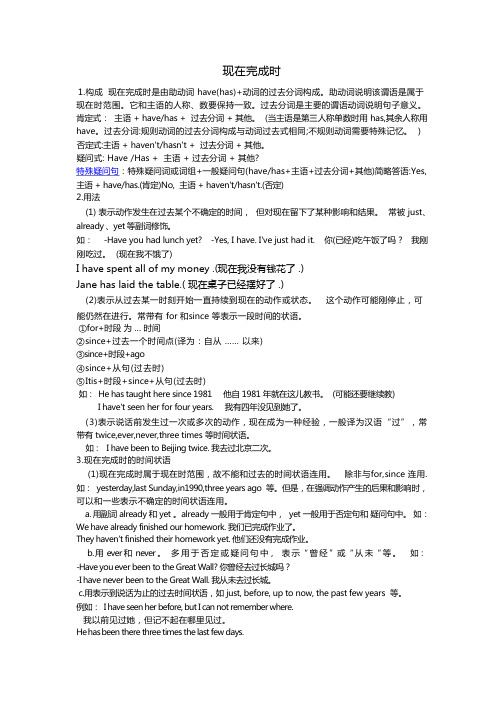
现在完成时1.构成现在完成时是由助动词 have(has)+动词的过去分词构成。
助动词说明该谓语是属于现在时范围。
它和主语的人称、数要保持一致。
过去分词是主要的谓语动词说明句子意义。
肯定式:主语 + have/has + 过去分词 + 其他。
(当主语是第三人称单数时用 has,其余人称用have。
过去分词:规则动词的过去分词构成与动词过去式相同;不规则动词需要特殊记忆。
) 否定式:主语 + haven't/hasn't + 过去分词 + 其他。
疑问式: Have /Has + 主语 + 过去分词 + 其他?特殊疑问句:特殊疑问词或词组+一般疑问句(have/has+主语+过去分词+其他)简略答语:Yes, 主语 + have/has.(肯定)No, 主语 + haven't/hasn't.(否定)2.用法(1) 表示动作发生在过去某个不确定的时间,但对现在留下了某种影响和结果。
常被 just、already 、yet 等副词修饰。
如: -Have you had lunch yet? -Yes, I have. I've just had it. 你(已经)吃午饭了吗?我刚刚吃过。
(现在我不饿了)I have spent all of my money .(现在我没有钱花了 .)Jane has laid the table.( 现在桌子已经摆好了 .)(2)表示从过去某一时刻开始一直持续到现在的动作或状态。
这个动作可能刚停止,可能仍然在进行。
常带有 for 和since 等表示一段时间的状语。
①for+时段为… 时间②since+过去一个时间点(译为:自从…… 以来)③since+时段+ago④since+从句(过去时)⑤Itis+时段+since+从句(过去时)如: He has taught here since 1981 他自 1981 年就在这儿教书。
英语专项 语法 时态 7 现在完成时 讲解+练习+答案 present perfect

Present Perfect Tense现在完成时主谓模块1:I have been我已经是...(结果)/我已经是...有一段时间了(“可延续性”)肯定句否定句一般疑问句及回答Yes, I have. / No, I haven’t.He has been a worker. He has not been a worker. Has he been a worker?Yes, he has. / No, he has n’t.She has been a worker. She has not been a worker. Has she been a worker?Yes, she has. / No, she has n’t.It has been a worker. It has not been a worker. Has it been a worker?Yes, it has. / No, it has n’t.We have been workers. We have not been workers. Have you been workers?Yes, we have. / No, we have n’t. You have been workers. You have not been workers. Have you been workers?Yes, we have. / No, we have n’t. They have been workers. They have not been workers. Have they been workers?Yes, they have. / No, they have n’t.主谓模块2:I have done我已经做过...(结果) (“非延续性”)/我已经做...有一段时间了(“可延续性”)肯定句否定句一般疑问句及回答Yes, I have. / No, I have n’t.He has worked. He hasn’t worked. Has he worked?Yes, he has. / No, he has n’t.She has worked. She has n’t work ed. Has she worked?Yes, she has. / No, she has n’t.It has worked. It has n’t work ed. Has it worked?Yes, it has. / No, it has n’t.We have worked. We have n’t worked. Have you worked?Yes, we have. / No, we have n’t. You have worked. You haven’t worked. Have you worked?Yes, we have. / No, we have n’t. They have worked. They have n’t work ed. Have they worked?Yes, they have. / No, they have n’t.标准句子结构●主谓模块1+X+时间模块I have been a worker for 10 years. 我当员工已经有10年了。
初中英语语法之现在完成时讲解练习及答案
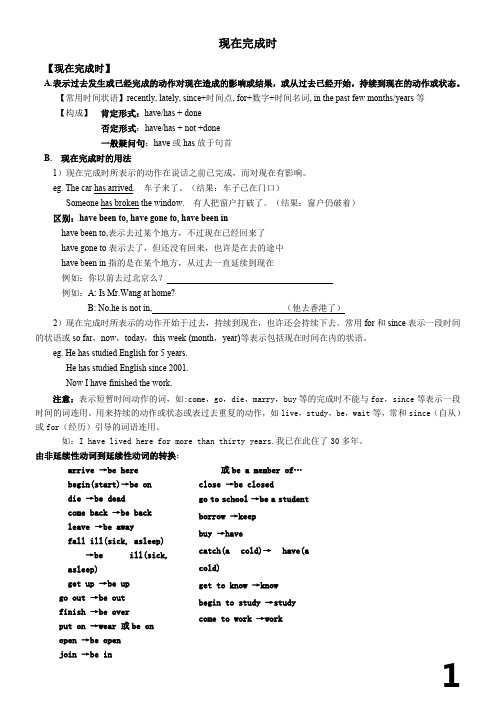
现在完成时【现在完成时】A.表示过去发生或已经完成的动作对现在造成的影响或结果,或从过去已经开始,持续到现在的动作或状态。
【常用时间状语】recently, lately, since+时间点, for+数字+时间名词, in the past few months/years等【构成】肯定形式:have/has + done否定形式:have/has + not +done一般疑问句:have或has放于句首B.现在完成时的用法1)现在完成时所表示的动作在说话之前已完成,而对现在有影响。
eg. The car has arrived.车子来了。
(结果:车子已在门口)Someone has broken the window.有人把窗户打破了。
(结果:窗户仍破着)区别:have been to, have gone to, have been inhave been to,表示去过某个地方,不过现在已经回来了have gone to表示去了,但还没有回来,也许是在去的途中have been in指的是在某个地方,从过去一直延续到现在例如:你以前去过北京么?例如:A: Is Mr.Wang at home?B: No,he is not in,(他去香港了)2)现在完成时所表示的动作开始于过去,持续到现在,也许还会持续下去。
常用for和since表示一段时间的状语或so far,now,today,this week (month,year)等表示包括现在时间在内的状语。
eg. He has studied English for 5 years.He has studied English since 2001.Now I have finished the work.注意:表示短暂时间动作的词,如:come,go,die,marry,buy等的完成时不能与for,since等表示一段时间的词连用。
现在完成时态讲解练习及答案

现在完成时态1.含义:表示过去发生的动作对现在造成的影响和结果。
2.标志词:recently,lately, since短语, for+时间段, up to now, so far,in the past/last few years, ever, never, yet, already, still3.构成: (1)肯定句:主语+ have / has+动词过去分词+其它.(2)否定句:主语+ have / has+not+动词过去分词+其它.(3)一般疑问句:Have / Has+ 主语+动词过去分词+其它?(4)特殊疑问句:特殊疑问词+have/has+主语+动词过去分词+其它?4. 例句:He has lived in Shenzhen for4years.5. 动词过去分词的变化规则:(1)规则变化:直接+ed; 直接+d; 把y变为i+ed; 双写+ed(2)不规则变化:寻找规律,加强记忆. 如AAA; AAB ; ABA ; ABB 等cut-cut-cut; beat-beat-beaten; come-came-come; lose-lost-lost 6. have/has been to; have/has gone to; have/has been in(1)have/ has been to去过… (人已经回来了)我去过上海两次。
I have been to Shanghai twice.(2)have/ has gone to去… (人还没回来)—吉姆在哪?—他去英国了。
—Where is Jim?—He has gone to England.(3)have/ has been in在… (去了某地并一直待在那里)我在上海已经有三年了。
I have been in Shanghai for three years.*7. 延续性动词与非延续性动词(1)含义:英语动词根据动作的持续与否可分为两种,一种是延续性动词,另一种是非延续性动词。
现在完成时练习题含答案及解析
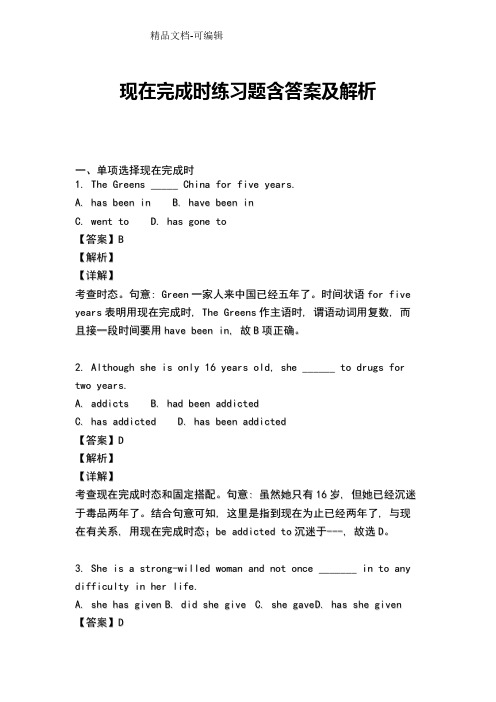
现在完成时练习题含答案及解析一、单项选择现在完成时1.T h e G r e e n s_____C h i n a f o r f i v e y e a r s.A.h a s b e e n i nB.h a v e b e e n i nC.w e n t t oD.h a s g o n e t o【答案】B【解析】【详解】考查时态。
句意:G r e e n一家人来中国已经五年了。
时间状语f o r f i v e y e a r s表明用现在完成时,T h e G r e e n s作主语时,谓语动词用复数,而且接一段时间要用h a v e b e e n i n,故B项正确。
2.A l t h o u g h s h e i s o n l y16y e a r s o l d,s h e______t o d r u g s f o rt w o y e a r s.A.a d d i c t sB.h a d b e e n a d d i c t e dC.h a s a d d i c t e dD.h a s b e e n a d d i c t e d【答案】D【解析】【详解】考查现在完成时态和固定搭配。
句意:虽然她只有16岁,但她已经沉迷于毒品两年了。
结合句意可知,这里是指到现在为止已经两年了,与现在有关系,用现在完成时态;b e a d d i c t e d t o沉迷于---,故选D。
3.S h e i s a s t r o n g-w i l l e d w o m a n a n d n o t o n c e_______i n t o a n yd i f f i c u l t y i n he r l if e.A.s h e h a s g i v e nB.d i d s h e g i v eC.s h e g a v eD.h a s s h e g i v e n 【答案】D【解析】试题分析:考查动词时态和倒装句。
- 1、下载文档前请自行甄别文档内容的完整性,平台不提供额外的编辑、内容补充、找答案等附加服务。
- 2、"仅部分预览"的文档,不可在线预览部分如存在完整性等问题,可反馈申请退款(可完整预览的文档不适用该条件!)。
- 3、如文档侵犯您的权益,请联系客服反馈,我们会尽快为您处理(人工客服工作时间:9:00-18:30)。
( 2 )用法:1 )现在完成时通常表示在说话之前已经完成的动作或存在的状态。
说话人强调的是该动作或状态对现在的结果或影响。
My daughter has just gone out. 我女儿刚出去。
I’m sure we’ve met before.我肯定我们以前见过面。
She has arrived. 她到了。
2 )表示持续到现在的动作或状态,往往和包括现在在内的表示一段时间的状语连用,如recently, already, just, lately, fo r…, since…,yet 等。
如:I haven’t heard from her these days.这些日子我没有收到她的信。
We haven’t seen you recently.最近我们没有见到你。
They have been away for two years. 他们离开已经两年了。
She has been with us since Monday.★注意:a) since 和for 的区别since 后接时间点,如1993 ,last term, yes terday, the time I got therefor 后接一段时间,表示“长达多久”,如ten years, a while, two days 等。
Ex ercise : 用since 和for 填空1. Jim has been in Ireland ______ Monday.2. Jill has been in Ireland ______ three days.3. His aunt has lived in Australia ______15 days.4. Mary is in her office. She has been there ______ 7o'clock.5. India has been an independent country ______1974.6. The bus is late. They've been waiting ______ 20 minutes.7. Nobody lives in those houses. They have been empty ______many years.8. Mike has been ill ______a long time. He has been inhospital ______ October.1. since2. for3. for4. since5. since6. for7. for8. since2 )表示短暂意义的动词如arrive, leave, borrow, buy, begin, start, die 等,在完成时当中不能和表示一段时间的状语连用,因为它们表示的动作不可能持续。
因此,不能说:He has come here for 2 weeks. ×The old man has died for 4 months. ×They have left only for 5 minutes. ×以上三句话可以改为:He has been here for 2 weeks.The old man has ______ _______ for 4 months.They have _____ _____ only for 5 minutes2 )have (has) been 和have (has) gone 的区别:表示“曾到过某地”要用“have (has) been”;表示“已经去某地”要用“have (has) gone”。
试比较:Where has he been 他刚才到哪里去了(已经回来了)Where has he gone 他上哪儿去了(人不在)They have been to Canada . 他们到过加拿大。
(现在已经不在加拿大)They have gone to Canada . 他们到加拿大去了。
(可能在路上和已经到加拿大).3 )现在完成时不能和表示过去的时间状语连用,如yesterday, last year, in 1976, two days ago, just now, when I came in ,但可以和already, yet, sometimes, always, often, before, lately, recently, once, twice, ever, never 等连用。
例如:She has already come. 她已经来了。
I haven’t read it yet.我还没读过这个。
I have met him before. 我从前曾见过他。
Ma Hong has always been a good student. 马红一直是个好学生。
I have often seen him in the street. 我经常在街上看见他。
They have never been to Yan’an.他们从未去过延安。
I haven't seen him lately. 我近来没看到他。
Irregular Verbs7. How long ________ the Wangs ______________(stay) here For two weeks.8. I ________ just ___________ (finish) my homework.9. He ________ (go) to school on foot every day.you ______ (find) your science book yet11. If it ____ (be) fine tomorrow, I'll go with you.12. The students ____________ (read) English when the teacher came in.13. Look! The monkey __________ (climb) the tree.14. My mother __________ (come) to see me next Sunday.15. I've lost my pen. _________ you ________ (see) it anywhere 1. have, seen, saw 2. Has, finished 3. has, come 4. has gone 5. have worked, moved 6. ha ve made 7. ha ve , stayed 8. have, finished 9. goes 10. have, found 11. is 12. were reading 13. is climbing 14. is coming 15. Have, seenII. Choose the best answer.1. How long have you _______ hereA. comeB. gotC. arrivedD. been2. My grandpa died _________.A. at the age of my 2B. for 2 yearsC. when I was 2.D. my age was 6.3. Jane has _____ to BeiJing . She will come back tomorrow.A. beenB. goneC. wentD. never been4. It is ten years _____ I last saw her.A. afterB. sinceC. forD. thatwill go to the station to meet Lorry--I will. I _____ her several times.A. metB. have metC. had metD. will meet6. --What a nice dress! How long _____ you _____ it--Just 2 weeks.A. will, buyB. did, buyC. are, havingD. have, hadyou know Lydia very well--Yes, She and I _____ friends since we were very young.A. have madeB. have becomeC. have beenD. have turned8. The Smiths _______ in China for 8 years.A. has livedB. livedC. have beenD. live9. --Hello, this is Mr. Green speaking. Can I speak to Mr. Black-- Sorry. He ______ the Bainiao Park .A. has been toB. has gone toC. went toD. will go to10. --____ you ever ____ to the US-- Yes, twice.A. Have, goneB. Have, been C, Do, go D. were, goingIII. Rewrite the sentences.1. I have been to Macau before. ( 改为否定句)I _ ________ _______ __ been to Macau before.2. He hasn’t come to school because he was ill . ( 就划线部分提问)___ ___ ___ ____ he come to school3. I bough a new bike just now. ( 用just 改写)I ____ just ____ a new bike.4. We began to learn English three years ago.( 改为同义句)We ____ ____English ____three years5 . He has never surfed, ___ ____ ___ ____ (改成反意疑问句)6 . They have been here since 2000 . ( 对划线部分提问)___ ____ ___ ____have they been here7 . The old man _________ last year. He has ___ ____ ___ ____for a year. (die) (动词填空)8 . Miss Gao left an hour ago. ( 同义句转换)Miss Gao has _______ ________ ________ an hour ago.A sk the questions1) I have been there for two days.______ ____ _________ _____ _____ you __________ __________2) My father has lived here since 2000._________ _________ __________ your father _________ __________3) He left here yesterday._________ ________ he _________ __________4) They bought a book two hours ago.__________ ___________ they __________ a bookKeys: 1. How long have, been there 2. How long has, lived here 3. When did, leave here 4. When did, buyUse “never, ever, already, just, yet, for, since ”to fill in the blanks.1. I have _______ seen him before, so I have no idea about him.2. Jack has _________ finished his homework.3. Mr. Wang has taught in this school ________ ten years.4. “Have you ________ seen the film” “No, I have ________ seen it.”5. “Has the bus left _______” “Yes, it has _________ left.”Keys: 1. never 2. just , already 3. for 4. ever, never 5. yet , just / already现在完成时练习题及答案一、翻译下列句子:你曾经吃过鱼和薯条吗2. 我刚刚丢了我的化学书。
